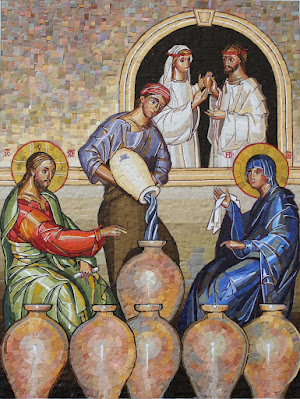THE FEAST.
January 16, 2022
Second Sunday in Ordinary Time – C.
READINGS: Is 62:1-5; Ps 96:1-2, 2-3, 7-8, 9-10; 1 Cor12:4-11; Jn 2:1-11.
“They have no wine.” (Jn 2:3)
A Polish proverb says: “Without salt the feast is spoiled.”
And a Spanish proverb adds: “The wedding feast is not made with mushrooms
only.”
Life is a continual feast, a joyful relationship with the
Lord. No feast must be sad. So too, life is not meant to be a succession of
sadness and bad news. To live, by itself is Good News. Even though, at the
present, the Covid-19 pandemic has plunged us all in continual sorrows, pains,
and tears, and has transformed life, making us speak of new normal: Isolation,
individualism, social death due to social distancing, we always must get a
reason to rejoice about and celebrate life.
In that sense, every day of life and alive is a day to
celebrate. I am from one part of the world where liturgical celebrations are
truly festive. They are made of songs, dances, shout of joys, acclamations,
processions. Someone said that Ivorian liturgies are long. And not only those
of Ivory Coast, but African Eucharistic celebrations are generally long.
Nevertheless, what makes them so long are not so much the homilies of the
priests, which for sure can and must be revised, but mostly the festive side. A
mass, a true eucharistic celebration is not meant to be melancholy. We do not
go and come out from Mass with a Good-Friday face. That is the logic with my
people. And I buy that idea. How can we celebrate thanksgiving and not rejoice
or dance? A feast must not be a sad affair, either wise, it loses its meaning
of the feast.
Maybe due to inculturation or traditions, but African
liturgies are beautiful, colorful, quite noisy, but festive. You get out from
mass always happy. And the charismatic groups have well seized that festive
dimension of the Mass and the liturgical gatherings. Upon arriving here in the
Philippines, I was quite lost with our celebrations. No dance, seldom a drum
set. Beautiful Mass, for sure, but somehow melancholic and less festive. We are
like singing Glorias and Alleluias in tears. I found one charismatic group
which made me relive in some ways my African liturgy. It is called “The FEAST”.
There, Masses are joy, acclamations, dances, songs, with drum playing.
Today's liturgy tells us that our relationship with the Lord
is like a wedding feast. As such, it must not be low-spirited or melancholic.
The Lord will supply to all that is missing for our joy to be perfect. Through
the Prophet Isaiah, the Lord promises restoration to his people. The City of
God, the City of Peace that was destroyed and oppressed by the enemies will be
restored and again become the beloved City of the Lord, the espoused. In it,
God, the bridegroom will rejoice over his bride. It shall no longer be called
the forsaken and its land desolate. It shall be a married land, belonging to
the Lord and where people merry. This opens to the great feast.
The image of the wedding is also that found in the Gospel
with the beautiful story of the wedding feast of Cana. There we are given to
see that a feast must not turn into desolation and sadness.
The Christian life is not the consecration of our sorrows
and griefs. We do not come to church to be sad and go back home mourning and
heartbroken. We come to receive comfort, consolation, and strength from the
Lord in order to face the realities and battles of life. The Lord Jesus has not
come so that we may mourn for lack or missing, but that we may find an answer
to our pleas.
The episode of the wedding feast at Cana, at the beginning
of the Lord's public ministry, proves it true. John says that "There was a
wedding at Cana in Galilee, and the mother of Jesus was there. Jesus and his
disciples were also invited to the wedding." But then, the feast going on,
something came missing. Imagine a feast without wine, and even more, a wedding.
What an unhappiness! The feast was going to turn into desolation. So, the
mother of the Lord noticed it and approached him. “They have no wine.” A
special mention of Mary's mission as Mediatrix. She saw the need and served as
a link, as a channel to the Lord. Without anyone asking her for it, she went
straight to the heart of her Son, because the Feast must not be sad. Short
dialogue between mother and son: “Woman, how does your concern affect me? My
hour has not yet come.” And she returned to another mediative mission, between
her son and the people: “Do whatever he tells you.” And this will make the
click: “Fill the jars with water... Draw some out now and take it to the
headwaiter.” And the joy came back on the faces: “Everyone serves good wine
first, and then when people have drunk freely, an inferior one; but you have
kept the good wine until now.”
The Lord gave the best wine for greater joy. For, the feast
must not turn sad. And he does the same in our daily lives. He comes at the
feast of our lives and turns the sorrowful situations into an occasion of
perfect joy. He always gives us the best. Our today’s questions and sorrows do
not have to make us go gloomy and worried. God in his providence is always at
our side, the guest of our lives.





Comments
Post a Comment